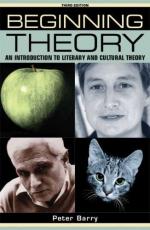
|
| Name: _________________________ | Period: ___________________ |
This test consists of 15 multiple choice questions and 5 short answer questions.
Multiple Choice Questions
1. Which of the following essays is an example of new historicism in practice written by Louis Montrose?
(a) A Midsummer Night's Dream.
(b) Lord of the Flies.
(c) The Sun Also Rises.
(d) Heart of Darkness.
2. Ecocriticism was a term that was applied to the work previously known as what form of writing?
(a) Scientific.
(b) Nature.
(c) Biological.
(d) Nurture.
3. In the phrase "the archival continuum," an important difference between old and new historicisms is encapsulated in the word ________, for that word indicates that new historicism is indeed a historicist rather than a historical movement.
(a) Historic.
(b) Continuum.
(c) New.
(d) Archival.
4. The panopticon was a design for a circular prison conceived by the eighteenth-century utilitarian ________.
(a) Sigmund Freud.
(b) Jeremy Bentham.
(c) Ray Bradbury.
(d) Anthony Burgess.
5. The narrator believes that after the moment of theory there comes, inevitably, the ________ of theory, when it ceases to be the exclusive concern of a dedicated minority and enters the intellectual bloodstream.
(a) Month.
(b) Hour.
(c) Week.
(d) Year.
6. According to Peter Barry in the chapter titled "Postcolonial Criticism," Frantz Fanon was a ________ from Martinique.
(a) Psychiatrist.
(b) Podiatrist.
(c) Cardiologist.
(d) Paleontologist.
7. According to the chapter titled "Marxist Criticism," what was the name of the group that had flourished in the 1920s until disbanded by the Party, even though their work was not strictly Marxist in spirit?
(a) Irish Formalists.
(b) Korean Formalists.
(c) German Formalists.
(d) Russian Formalists.
8. According to Peter Barry at the beginning of the book "Beginning Theory," many of the chapters in the book were based on material Barry has used in the "Introduction to Literature" courses at what university?
(a) TSU.
(b) ASU.
(c) LSU.
(d) FSU.
9. Peter Barry affirms that Friedrich Engels was a German ________.
(a) Radiologist.
(b) Criminologist.
(c) Sociologist.
(d) Philosopher.
10. According to Peter Barry, stylistics developed in what century?
(a) Twentieth.
(b) Twenty-first.
(c) Nineteenth.
(d) Eighteenth.
11. ________ read major works from an ecocritic point of view and extend the application of concepts to areas other than the natural world.
(a) Ecologists.
(b) Ecofeminists.
(c) Ecocritics.
(d) Ecocentrists.
12. Which of the following two writers were stigmatized as exemplars of "bourgeois decadence"?
(a) Aristotle and Plato.
(b) Proust and Joyce.
(c) Aesop and Aeschylus.
(d) Jane Austen and Stephanie Meyers.
13. Stylistics is the modern version of the ancient discipline known as ________, which taught its students how to structure an argument.
(a) Neoclassicism.
(b) Rhetoric.
(c) Neoplatonism.
(d) Philology.
14. Which Greek philosopher identified three elements in a plot, fault or character-defect, recognition, and reversal, which are all incumbent on the hero or heroine?
(a) Aristotle.
(b) Confucius.
(c) Sophocles.
(d) Plato.
15. According to the chapter "Narratology," Russian formalist Vladimir Propp identified how many actions in a tale with seven spheres of action to animate?
(a) 31.
(b) 63.
(c) 23.
(d) 13.
Short Answer Questions
1. Who does the narrator describe as a prominent contributor to "Inside/Outside," who pointed out that "identity categories," like "gay" and "straight," "tend to be instruments of regulatory regimes"?
2. In the chapter titled "Narratology", ________ means slow telling where an author stages a tale for readers whereas ________ means relating where the narrator summarizes events without trying to create an illusion.
3. According to Peter Barry, the aim of Marxism was to bring about a ________ society, based on the common ownership of the means of production, distribution, and exchange.
4. ________ is a co-founder of ecocriticism with Harold Fromm that developed in the early-1990s in the USA.
5. Lesbian theory that broke away from feminism and made new allegiances, in particular, with gay men rather than with other women is called "queer theory" or ________.
|
This section contains 571 words (approx. 2 pages at 300 words per page) |

|




